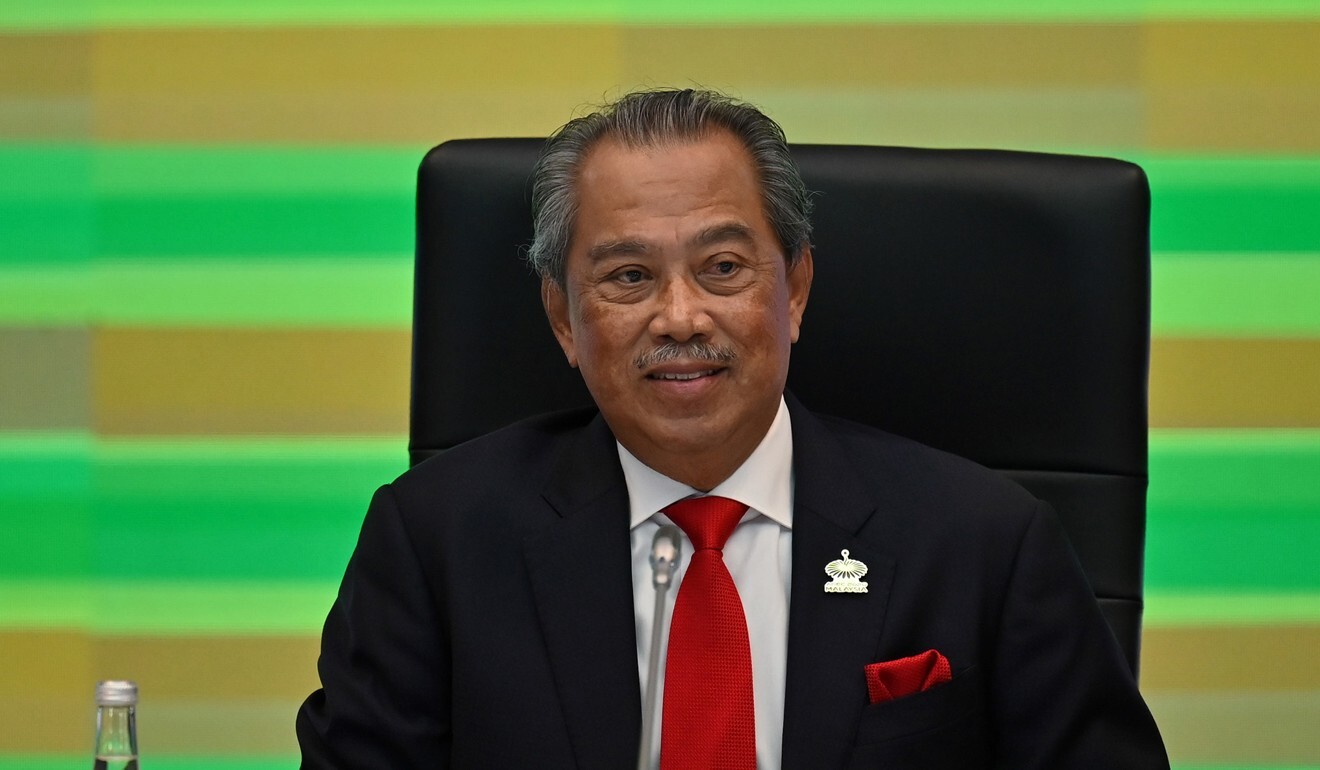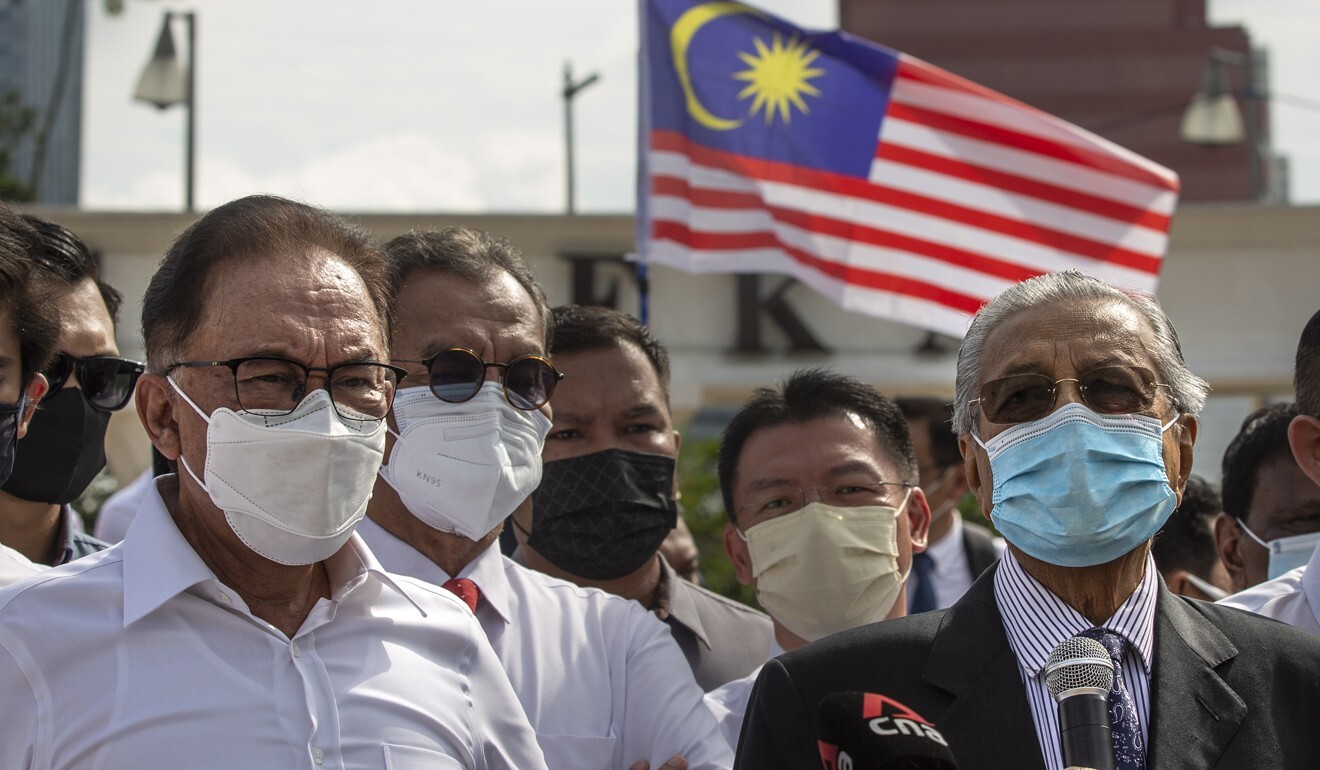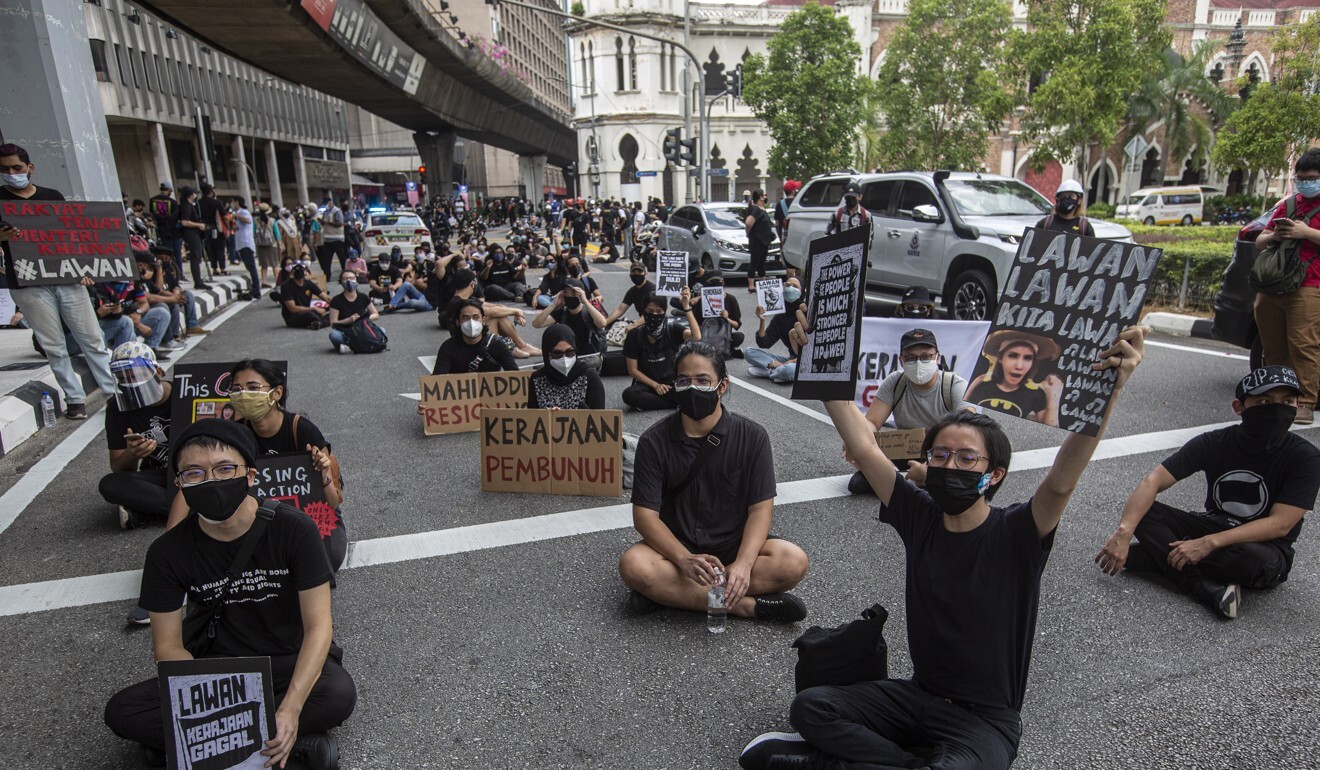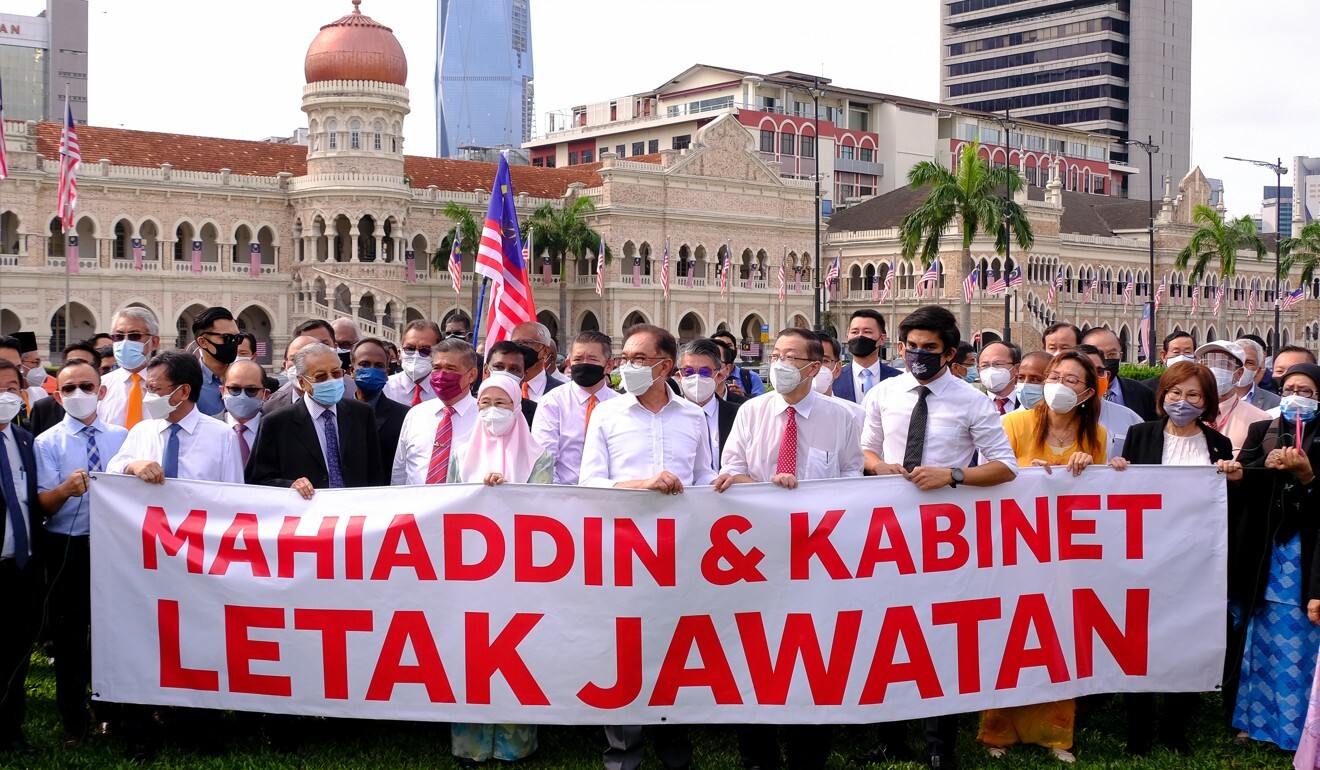
Malaysia’s Muhyiddin has mastered dodging the opposition – but will a showdown with the king prove his undoing?
- The embattled prime minister has nimbly avoided repeated efforts to unseat him, but the monarch’s unprecedented rebuke last week has raised eyebrows
- Analysts say Muhyiddin is unlikely to be sacked – but some feel Australia’s 1975 constitutional crisis shows a path to do so within the Commonwealth
In unprecedented fashion, the constitutional monarch last week publicly chastised the Perikatan Nasional government over what he said was a deliberate attempt to mislead parliament over the status of emergency powers.
There was a growing consensus that “Muhyiddin has become, in a sense, a rogue prime minister and that it’s time [for Sultan Abdullah] to dismiss him,” said political analyst Oh Ei Sun.

On Monday, the country’s deep political dysfunction once again grabbed global headlines as opposition lawmakers briefly faced off with riot police as they tried to march to the parliament building.
All members of parliament were informed over the weekend that Monday’s proceedings, the final part of a planned five-day session, would be postponed, but opposition groups insisted on gathering to enter the premises.
They said the sitting’s delay, ostensibly due to a Covid-19 outbreak in the legislative building, was an excuse to prevent a no-confidence vote they planned to bring against Muhyiddin.
With parliament cordoned off, opposition lawmakers gathered at the historic Dataran Merdeka, or Independence Square, to address the media.
Mahathir, 96 – toppled by Muhyiddin’s political coup last year – said it would be honourable for the current premier to step aside on his own rather than be thrown out of power by the people.
The opposition contends that Muhyiddin is doing all he can to avoid any form of voting in parliament as it would show he does not command support from a majority of MPs.

Parliament sat from Monday to Thursday for the first time in months, during which proceedings were repeatedly interrupted by shouting matches as the opposition accused the government of misleading lawmakers over whether the termination of a six-month Covid-19 state of emergency required a legislative vote.
Those accusations then received the endorsement of Sultan Abdullah, who midway through Thursday’s proceedings issued a press statement that expressed “deep disappointment” over the executive’s actions.
Muhyiddin responded defiantly after the royal rebuke, insisting that his government had not acted improperly, despite the king’s suggestion, and tacitly reminding the monarch that he was legally obliged to adhere to the cabinet’s advice.
Over the weekend, he ordered the postponement of Monday’s sitting and a subsequent session of the upper house, the Dewan Negara, citing parliamentary standing orders that gave him prerogative powers to do so.

02:01
Malaysia’s Covid-19 case toll tops 1 million as nation sees record day of infections
‘Australian precedent’
Observers such as analyst Oh are refusing to rule out the possibility that the chain of events – including the prime minister’s refusal to allow debate on the state of emergency – could precipitate Sultan Abdullah’s sacking of Muhyiddin for what is seen as insolence towards royalty.
As Yang di-Pertuan Agong, or king, Sultan Abdullah wields limited constitutional powers in the same manner as Western constitutional monarchs.
The male heads of the country’s nine royal households, revered as the guardians of Malay culture and the Islamic faith, take turns to be king for five-year stints.
In a blog post over the weekend, Mahathir also referenced this case.
“The king could take the proactive step to dismiss the prime minister because … he refuses to submit himself to any sort of determination as to whether he still possesses a legislative majority,” Oh said.
“That is a kind of wilful and sinister way of avoiding a democratic test. In that case, we have a recalcitrant prime minister, and the king – with the John Kerr-Whitlam precedent in the Commonwealth – could go ahead and dismiss him,” said the senior fellow at the Singapore Institute of International Affairs.
Awang Azman Awang Pawi, a socio-political analyst with the University of Malaya, said he believed the likelihood of such an outcome was very low.

Ensuring the government adhered to the norms of constitutional monarchy, rather than any particular political outcome, remained the key concern for Sultan Abdullah and the country’s other royals, Awang Azman said.
Sultan Abdullah can convene a Conference of Rulers to seek the advice of the other sultans on his next course of action, if he so requires – though he is not obliged to adhere to their consensus view.
“The Yang di-Pertuan Agong and Malay rulers will want to make sure they are seen as neutral and prioritising the handling of the Covid-19 crisis and the economic situation,” said Awang Azman, adding that he did not believe the royals would consider taking the “unprecedented step” of explicitly endorsing the removal of a sitting prime minister.
Any action against Muhyiddin would have to be taken by political players themselves based on their interpretation of the Malay rulers’ intentions, he said.
Also addressing the influence of Sultan Abdullah in the crisis’ eventual resolution is noted political analyst Bridget Welsh, who on Monday during a radio interview said there were indications the country’s Malay heartland “is very unhappy about how the king has been spoken to”.
These sentiments were being “capitalised on politically by different sets of actors”, she noted, adding that Sultan Abdullah himself was a popular figure.
Traditionally, conversations of a similar nature between royals and members of the executive branch usually involve the latter making “some sort of appeasement”, Welsh told BFM’s The Morning Run. “The fact that Muhyiddin Yassin has chosen to escalate the relationship is … likely to suggest that we are going to have a very interesting week ahead in terms of politics and Malay politics.”

Muhyiddin to ‘limp on’
While Muhyiddin is facing a groundswell of anti-government sentiment – with hundreds of youths gathering over the weekend to demonstrate, in defiance of Covid-19 rules – his medium-term staying power is partly guaranteed by infighting among his challengers, other observers said.
Anwar, 73, has for months stated that he has the numbers to defeat Muhyiddin in a no-confidence vote, but has thus far been unable to prove his claims.
Anyone who wants to be prime minister must show they command a majority of MPs among the 220 seats that are currently occupied in the 222-seat parliament. Anwar on Monday said he had the backing of 107 MPs.
“Muhyiddin’s government has come under increasing pressure on multiple fronts, but despite all the noise no other MP – including opposition leader Anwar Ibrahim – has been able to muster the numbers required to oust Muhyiddin and secure the premiership for themselves,” said Peter Mumford at Eurasia Group, a political risk consultancy. “As long as that remains the case, Muhyiddin will be able to limp on until Covid-19 subsides and elections can take place.”
Harrison Cheng, of the Control Risks consultancy, said he believed “Muhyiddin still has the stomach to fight for his survival, despite the backlash that the revocation of the emergency ordinances has provoked among the opposition and the public”.
A split within Umno – the biggest bloc in Muhyiddin’s government – and a lack of unity within Anwar’s camp on whether he should be the next prime minister gave the embattled incumbent an edge despite his troubles, the Singapore-based analyst said.
“The Yang di-Pertuan Agong probably does not favour Muhyiddin, but he also has to consider the need for some measure of stability so the country has a decent chance at dealing with the Covid-19 situation,” Cheng said.
He suggested Muhyiddin could lose power in the coming weeks if the opposition resolved to back a single candidate as prime minister, or if the premier’s own allies in the Perikatan Nasional government – including Umno and his own Bersatu party – began talking about replacing him.

